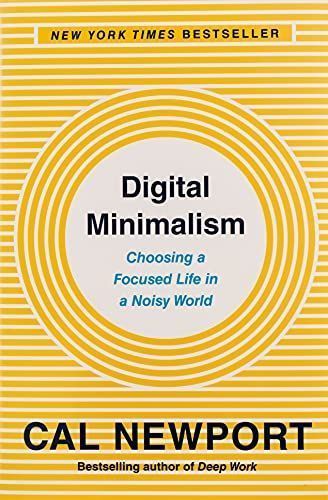
Digital Minimalism Choosing a Focused Life in a Noisy World
New York Times Bestseller 'Digital Minimalism is the Marie Kondo of mobile phones' Evening Standard 'An eloquent, powerful and enjoyably practical guide to cutting back on screen time' The Times 'An urgent call to action for anyone serious about being in command of their own life' Ryan Holiday, author of The Obstacle is the Way 'What a timely and useful book' Naomi Alderman, author of The Power Cut down on screen time and get your technology use in check The urge to pick up our phones every few minutes has become a nervous twitch that shatters our time into shards too small to be present. Our addiction to tech leaves us feeling exhausted and overwhelmed. But it doesn't have to be that way. In this timely book, professor Cal Newport shows us how to pair back digital distractions and live better with less technology. Introducing us to digital minimalists -- the calm, happy people who can hold long conversations without furtive glances at their phones or obsessively document everything they eat -- Newport reveals how to live more intentionally in our tech-saturated world. By following a thirty-day 'digital declutter' process, you'll learn to: · Rethink your relationship with social media · Prioritize 'high bandwidth' conversations over low quality text chains · Rediscover the pleasures of the offline world Take back control from your devices and become a digital minimalist.
Reviews
Ricky@rickynaarea
Timeo Williams@timeowilliams
Elisavet Rozaki @elisav3t
Malcolm Reddoch@mreddoch
Jason Lo@y2bd
JoAnna@lilipuddingdog
Jayme Cochrane@jamesco
Haley Park@snek
erin@urn
Elizabeth Wood@ejwood41
Anca B@crashbandicoot
Bi@mytileneve
Lara Ximenes@laraximenes
Matt Stein@mattstein
Okan Davut@okandavut
Morgan Holland@morgz
Darma Paramarta@darma
Angelica Echeverry@anma
Sierra Nguyen@sierra-reads
Andy Sporring@andysporring
Julien Sobczak@julien-sobczak
Patrick Ludewig@patrick
Fatih Arslan@fatiharslan
linda@lkt
Highlights
mari@soulnotes
Mariana Rocha@tenebraeis
Page 77
JP Juinio@jpjuinio
JP Juinio@jpjuinio
JP Juinio@jpjuinio
fvrests@oat
Page 165
fvrests@oat
Page 216
fvrests@oat
Page 22
JP Juinio@jpjuinio
Page 155
JP Juinio@jpjuinio
JP Juinio@jpjuinio
JP Juinio@jpjuinio
JP Juinio@jpjuinio
Page 8
Linus Rogge@linusrogge
Linus Rogge@linusrogge
Linus Rogge@linusrogge
Linus Rogge@linusrogge
Linus Rogge@linusrogge
Page 104
Linus Rogge@linusrogge
Izzy O@greedyforbooks
Claudine@claudrod
Claudine@claudrod
Claudine@claudrod
Claudine@claudrod